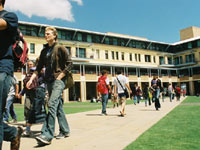|
|||||||||||||
| School of Marketing | |||||||||||||

School Website Overview Head of School: Ashish Sinha
School Mananger: Nadia Withers Marketing is a dynamic management discipline concerned with exchange processes in competitive markets. It is of critical importance in all sectors of the economy, including local and international businesses and profit making and non-profit organisations. The business function of marketing seeks to identify the needs and wants of customers, determine potential target markets, design appropriate products and services, develop pricing strategies, communicate this offering to customers and distribute it to the marketplace. A wider goal of marketing is to create an organisation-wide ethos that is responsive to customer needs, aware of competitive forces and builds on core strengths of the organisation. Graduates find careers in product and brand management, service quality management, new product planning, international marketing, logistics and distribution, sales and purchasing, advertising, direct marketing and public relations, marketing research, management consultancy and e-business. Graduates find their skills are in heavy demand across both public and private sectors, nationally and internationally. Professional accreditation has been given to graduates of our programs by the Australian Market and Social Research Society. There are also affiliations with professional organisations such as the Advertising Federation of Australia, the Australian Marketing Institute, the Australian Direct Marketing Association and the Australian Customer Service Association. Undergraduate Programs Undergraduate Marketing: The School of Marketing offers undergraduate programs leading to the award of the degree of Bachelor of Commerce and Bachelor of Economics. An intellectually rigorous approach is combined with a desire for practical relevance. This entails drawing not only on the general field of marketing but also the related disciplines of economics, finance, psychology, sociology, business law, and statistics. Relevance is achieved through case studies, real-world projects and the business experience of teaching staff. The Honours year deals with more advanced themes in marketing and students are required to submit a well-researched thesis. Co-op Scholarships: The Marketing Co-op program provides industry experience integrated with the academic requirements for the Bachelor of Commerce. Entry is gained through the Co-op selection process. For further details on Co-op scholarships, contact the UNSW Co-op Program Office, telephone (02) 9385 5116, website: www.coop.unsw.edu.au. Undergraduate Services Marketing - Tourism and Hospitality: A specialist four-year undergraduate degree program in Services Marketing - Tourism and Hospitality is available within the School. This program adds tourism and hospitality management courses to the full range of marketing courses but with a broader service industry focus. These additional courses include tourism policy and planning, managing people in the services industry, tourism and hospitality law, destination marketing, entrepreneurship, services marketing and facilities management for hotels, resorts and restaurants. Students receive practical training at an approved training college and are required to complete at least 250 hours of industry work experience as part of the program, adding to the richness of the degree. Our graduates enter careers in tourism, airlines, hotels, and resorts as well as media, publishing, advertising, and financial services - in addition to marketing roles in consumer goods companies. Postgraduate Programs Master of Marketing: The specialist Master of Marketing exists for those applicants with 2-3 years or more relevant business experience and who wish to extend and deepen their knowledge of Marketing. It is an advanced program that, in unique and innovative ways, marries contemporary Marketing issues with a critical, research-based approach to learning. MCom in Marketing: Graduates of any discipline wanting to acquire knowledge of Marketing are encouraged to enrol in the Marketing Specialisation of the MCom degree. This program features courses in the areas of e-marketing, international marketing, services and business-to-business marketing, marketing in Asia, marketing communications, new product development, retailing and logistics and customer analysis. This program is designed for those who seek to broaden their business horizons after studying a non-marketing program as an undergraduate. MCom in Tourism Marketing: A specialisation in Tourism Marketing within the MCom exists for those wishing to study Marketing in combination with Tourism and Hospitality Management. The program covers all core areas of tourism and hospitality management, and takes advantage of strong links with industry and government. Industrial training is available as an additional and optional component of the program. PhD and MPhil: A small number of places are available each year for students wishing to undertake postgraduate research in Marketing or Tourism. The PhD program requires students to complete at least four research courses in the School of Marketing and submit a major research thesis. A Master of Philosophy program is also available. Contact the School for program brochures or consult the website: www.marketing.unsw.edu.au.
Undergraduate Specialisations
Postgraduate Specialisations
Research Specialisations
|
|||||||||||||



